Review from: Circomedia; 26th Sept 2019
I don’t often see serious theatre about deep and consequential topics any more. Rarely does that world collide with the one of circus. ‘The Escape Act‘, however, combines real life circus history with the encroaching power of nationalism in Hitler’s Germany. Its subtitle is ‘A Holocaust Memoir‘, but this is not a bleak piece of documentary. Instead, it’s a vibrant and charming portrait of one Jewish performer’s escape thanks to the kindness of circus owners Adolf and Maria Althoff and their troupe, interspersed with moments where solo performer Stav Meishar confronts personal repercussions of the genocide that continue to haunt surviving families three generations later.
Stav is a consummate theatre-maker, combining puppetry and projections to bring the voices of the story to life, as well as popping in a couple of well chosen circus skill snippets – juggling in the face of a Nazi audience member, or hanging from a trapeze giving birth in a German hospital that refused pain medication or careful attention to Jewish patients.
The focus of the story is the life of Irene Danner, who grew up as a member of the famed Lorch family circus. Without giving away too many details, anti-Jewish sentiment forced their company into bankruptcy, and Irene found herself hiding amongst the Bentos clowns on Althoff’s circus for the majority of the war. The show’s website includes more information about the historical events and research that have led to the production, but seeing these lives recreated through performance packs more entertainment – and a bigger emotional hit – than just reading about them online.
Because circus and human tragedy of this scale are actually perfect companions. Both can seem incomprehensible. Both make people think ‘It’s impossible. It’s impossible!‘. Until you see it taking place before your eyes. Most pertinently to our world today, The Escape Act reveals the slow unfolding of good people doing nothing over and over again, until the unthinkable becomes commonplace. Humans, it turns out, are not very good at noticing incremental change. Much less so at doing something about it.

The Escape Act has evolved out of the twin strands of Stav’s career: performance, and education in Jewish history. I can imagine it working great for Key Stage 3 students, but it’s also successful for me as an adult. Written and devised by Stav (including verbatim text from interviews with Irene) and directed by Shoshana Bass, the story is engaging and the theatre-craft is meticulous. The puppetry is accomplished, shifting effectively between paper-doll style cutouts in a pop-up suitcase house, glove puppets reminiscent of Punch and Judy creations, and near life-size model head-and-torsos that are manipulated with a whole arm and that – with one on each of Stav’s shoulders – allow fast-paced three-way conversations to be conducted between characters as if they are all live on stage before us. Strong use of pause is both dramatic and pragmatic, providing space for the necessary respite of a solo performer – and an audience’s ear – in a production densely packed with textual content.
In a Q&A after the show, Stav acknowledges that there are many more fascinating details of Irene Danner’s story than can fit into a one-act play, and that the piece has room to grow and develop accordingly. The current selection, however, allows for a smoothy narrated throughline, while the injection of Stav’s own reality into Irene’s history mitigates the concerted theatricality of the recreation that might otherwise border on twee. The tightly constructed production is a pleasure to watch, harrowing as the reminders of human horror are. Because there are reminders too of human resistance and compassion that, right here, right now, are vital, vital stuff.



